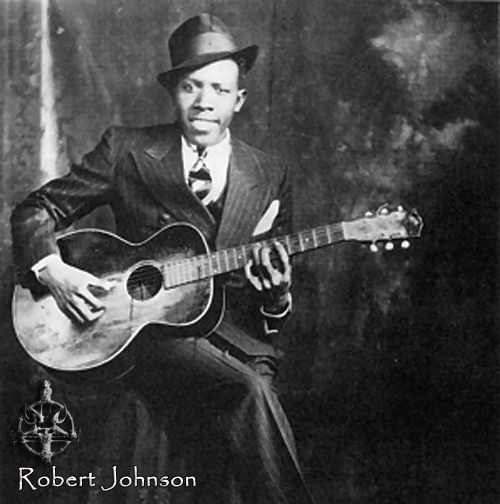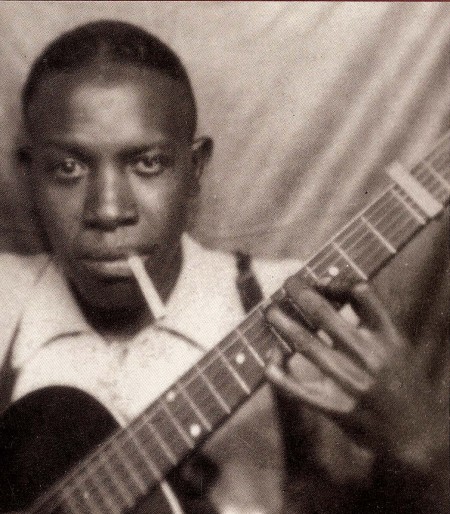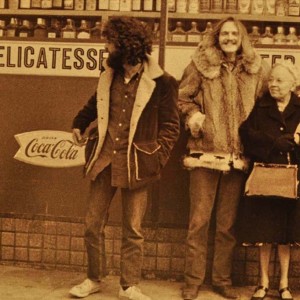| Robert Johnson (May 8, 1911 – August 16, 1938) – read more
“You think you’re getting a handle on playing the blues, and then you hear Robert Johnson — some of the rhythms he’s doing and playing and singing at the same time, you think, ‘This guy must have three brains!’ ” — |
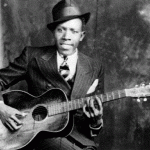 |
| Bob Dylan: Love Minus Zero/No Limit, Savoy Hotel, London England 8 May 1965 (Video) – read more
The Bob Dylan England Tour 1965 (April 30 – May 10) was a concert tour by American singer-songwriter Bob Dylan during late April and early May 1965. The tour was widely documented by filmmaker D. A. Pennebaker, who used the footage of the tour in his documentary Dont Look Back. |
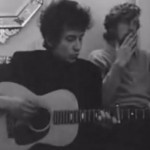 |
| Keith Jarrett (born May 8, 1945, in Allentown, Pennsylvania) is an American pianist and composer who performs both jazz and classical music. Jarrett started his career with Art Blakey, moving on to play with Charles Lloyd and Miles Davis. Since the early 1970s he has enjoyed a great deal of success in jazz, jazz fusion, and classical music; as a group leader and a solo performer. His improvisations draw not only from the traditions of jazz, but from other genres as well, especially Western classical music, gospel, blues, and ethnic folk music. |  |
| Let It Be is the 12th and final studio album released by the English rock band The Beatles. It was released on 8 May 1970 by the band’s Apple Records label shortly after the group announced their break-up. | 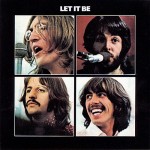 |
| Richard Edward Arnold (May 15, 1918 – May 8, 2008), known professionally as Eddy Arnold, was an American country music singer who performed for six decades. He was a so-called Nashville sound (country/popular music) innovator of the late 1950s, and scored 147 songs on the Billboard country music charts, second only to George Jones. He sold more than 85 million records. A member of the Grand Ole Opry (beginning 1943) and the Country Music Hall of Fame (beginning 1966), Arnold ranked 22nd on Country Music Television’s 2003 list of “The 40 Greatest Men of Country Music.” He co-wrote the country and pop standard “You Don’t Know Me”. | 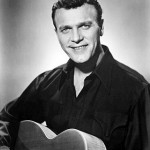 |
| Daniel Ray Whitten (May 8, 1943 – November 18, 1972) was an American musician and songwriter best known for his work with Neil Young and Crazy Horse, and for the song “I Don’t Want To Talk About It”, a hit for Rita Coolidge, Rod Stewart and Everything but the Girl. | 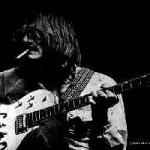 |
| Chris Frantz (born Charlton Christopher Frantz, May 8, 1951, Fort Campbell, Kentucky, United States) is an American musician and record producer. He was the drummer for both Talking Heads and the Tom Tom Club. | 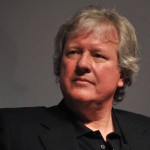 |
| Gary Glitter (born Paul Francis Gadd on 8 May 1944) is an English former glam rock singer-songwriter and musician. | 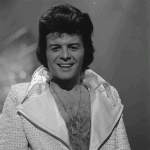 |
Spotify Playlist – May 8 |
|
Tag Archives: Danny Whitten
Today: The late Robert Johnson was born in 1911 – 102 years ago
“Just look at the picture of him with the acoustic guitar: His fingers are in the weirdest position. If you’re a guitar player looking at that, you know this is a guy who’s not even thinking; he’s just there. … The soul of his creative originality plays a huge part in music making for everyone who’s ever written a song and really known what they’re doing.”
~Neil Young“You think you’re getting a handle on playing the blues, and then you hear Robert Johnson — some of the rhythms he’s doing and playing and singing at the same time, you think, ‘This guy must have three brains!’ ”
~Keith RichardsFavorite album? I think the Robert Johnson album. I listen to that quite a bit still.
~Bob Dylan (Rockline interview – June 1985)
Cross Road Blues:
| Birth name | Robert Leroy Johnson |
|---|---|
| Born | May 8, 1911 Hazlehurst, Mississippi |
| Died | August 16, 1938 (aged 27) Greenwood, Mississippi |
| Genres | Delta blues, Country blues |
| Occupations | Musician, songwriter |
| Instruments | Guitar, vocals, harmonica |
| Years active | 1929–38 |
Robert Leroy Johnson (May 8, 1911 – August 16, 1938) was an American blues singer and musician. His landmark recordings from 1936–37 display a combination of singing, guitar skills, and songwriting talent that have influenced later generations of musicians. Johnson’s shadowy, poorly documented life and death at age 27 have given rise to much legend, including a Faustian myth. As an itinerant performer who played mostly on street corners, in juke joints, and at Saturday night dances, Johnson enjoyed little commercial success or public recognition in his lifetime.
Johnson’s records sold poorly during his lifetime. It was only after the reissue of his recordings in 1961 on the LP King of the Delta Blues Singers that his work reached a wider audience. Johnson is now recognized as a master of the blues, particularly of the Mississippi Delta blues style. He is credited by many rock musicians as an important influence; Eric Clapton has called Johnson “the most important blues singer that ever lived.” Johnson was inducted into the Rock and Roll Hall of Fame as an “Early Influence” in their first induction ceremony in 1986. In 2003, David Fricke ranked Johnson fifth in Rolling Stone’s list of the 100 Greatest Guitarists of All Time.
Me and the Devil Blues:
…Johnson’s major influence has been on genres of music that weren’t recognized as such until long after his death: rock and roll and rock. The Rock and Roll Hall of Fame included four of his songs in a set of 500 they deemed to have shaped the genre:
- “Sweet Home Chicago” (1936)
- “Cross Road Blues” (1936)
- “Hellhound on My Trail” (1937)
- “Love in Vain” (1937)
Johnson recorded these songs a decade and a half before the recognized advent of rock and roll, dying a year or two later. The Museum inducted him as an “Early Influence” in their first induction ceremony in 1986, almost a half century after his death. Marc Meyers of the Wall Street Journal wrote that, “His ‘Stop Breakin’ Down Blues’ from 1937 is so far ahead of its time that the song could easily have been a rock demo cut in 1954.
Playlist of the day:
Other May-08:
Continue reading Today: The late Robert Johnson was born in 1911 – 102 years ago
Today: Danny Whitten died in 1972, 40 years ago
“I am not a preacher, but drugs killed a lot of great men.”
– Neil Young (liner notes Decade)
Danny Whitten died 18 November 1972, 40 years ago
Daniel Ray Whitten (May 8, 1943 – November 18, 1972) was an American musician and songwriter best known for his work with Neil Young and Crazy Horse, and for the song “I Don’t Want To Talk About It“, a hit for Rita Coolidge, Rod Stewart and Everything but the Girl.
Songwriter Neil Young, fresh from departing the Buffalo Springfield, with one album of his own under his belt, began jamming with the Rockets and expressed interest in recording with Whitten, Molina and Talbot. The trio agreed, so long as they were allowed to simultaneously continue on with The Rockets: Young acquiesced initially, but imposed a rehearsal schedule that made that an impossibility. At first dubbed “War Babies” by Young, they soon became known as Crazy Horse.
Nils Lofgren – Beggar’s Day (Eulogy for Danny Whitten):
Recording sessions led to Young’s second album, Everybody Knows This Is Nowhere, credited as Neil Young with Crazy Horse, with Whitten on second guitar and vocals. Although his role was that of support, Whitten sang the album’s opening track “Cinnamon Girl” along with Young, and Whitten and Young played guitar on “Down by the River” and “Cowgirl in the Sand.” These tracks would influence the grunge movement of the 1990s, and all three songs would be counted among Young’s most memorable work, continuing to hold a place in his performance repertoire to this day.

As did so many other rock musicians in the late 1960s, Whitten began using heroin and quickly became addicted. Although he participated in the early stages of Young’s next solo effort, After the Gold Rush, Whitten and the rest of Crazy Horse were dismissed about halfway through the recording sessions, in part because of Whitten’s heavy drug use. Whitten performs on “Oh, Lonesome Me”, “I Believe in You”, and “When You Dance I Can Really Love”. Young wrote and recorded “The Needle and the Damage Done” during this time, with direct references to Whitten’s addiction and its role in the destruction of his talent.
Continue reading Today: Danny Whitten died in 1972, 40 years ago

